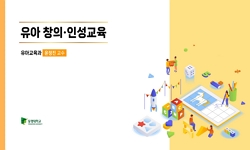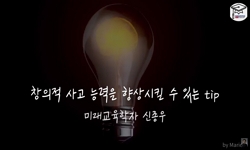1 이주화, "학업적 성취목표지향성 척도 개발" 한국교육심리학회 19 (19): 311-326, 2005
2 한순미, "학습동기 변인들과 인지전략 및 학업성취간의 관계" 한국교육심리학회 18 (18): 329-350, 2004
3 봉미미, "학습 동기관련 연구의 최근동향" 31 (31): 120-134, 2000
4 유경훈, "초등학생의 자기결정성 동기와 창의적 사고능력" 한국아동교육학회 16 (16): 229-240, 2007
5 박성익, "초등학생의 성취목표 동기유형과 창의적 사고력·창의적 인성 간의 관계분석" 한국교육심리학회 24 (24): 139-160, 2010
6 조석희, "초등학교 고학년의 창의적 문제해결력에 영향을 미치는 정의적 특성에 대한 경로 분석" 한국교육심리학회 19 (19): 745-760, 2005
7 김청자, "창의적 인성과 성취목표 동기와의 관계연구" 한국열린교육학회 17 (17): 1-20, 2009
8 하주현, "창의적 인성검사(CPS)의 연령별 타당화 및 연령별 발달경향 연구" 15 (15): 323-351, 2001
9 성은현, "창의적 사고력과 공간도형지능, 학업성적, 창의적 인성과의 관계" 한국교육심리학회 17 (17): 351-372, 2003
10 정종진, "창의성에 대한 다원적 접근과 그 교육적 시사" 18 (18): 327-346, 2003
11 박병기, "창의성교육의 기반" 교육과학사 1998
12 박병기, "창의성과 학습동기의 관계" 한국교육심리학회 20 (20): 651-678, 2006
13 박병기, "창의성과 지능의 관계구조" 14 (14): 235-261, 2000
14 Urban, K. K., "창의성-요소적 접근모델" 24 (24): 5-27, 1996
15 김혜숙, "창의성 진단 측정도구의 개발 및 타당화" 13 (13): 269-303, 1999
16 조석희, "창의성 증진을 위한 교수-학습에 관한 교육심리학의 역할과 과제" 13 (13): 79-103, 1999
17 김혜숙, "창의성 구조 모형의 검증" 한국교육심리학회 16 (16): 229-245, 2002
18 김청자, "중등학생의 창의성과 성취동기 및 내재적 외재적동기와의 관계연구" 한국열린교육학회 13 (13): 75-101, 2005
19 박병기, "자기보고형 통합 창의성 척도의 개발 및 타당화" 한국교육심리학회 20 (20): 155-177, 2006
20 박병기, "자기결정성이론이 제안한 학습동기 분류형태의 재구성" 한국교육심리학회 19 (19): 699-717, 2005
21 김아영, "자기결정성 정도에 따른 동기유형의 분류" 15 (15): 97-119, 2001
22 김아영, "자기결정성 이론에 따른 학습동기유형 분류체계의 타당성" 한국교육심리학회 16 (16): 169-187, 2002
23 김청자, "자기결정성 동기유형과 창의적 인성 요인과의 관계 연구" 교육과학연구소 37 (37): 237-256, 2006
24 최인수, "아동의 창의성과 성격 및 지능간의 관계: 창의성검사, Holland검사, Raven검사를 중심으로" 한국교육심리학회 19 (19): 135-158, 2005
25 송정남, "성취목표와 보상 기대가 내적동기와 창의성에 미치는 영향" 성균관대학교 2000
26 김아영, "교실에서의 동기" 한국교육심리학회 17 (17): 5-36, 2003
27 김아영, "“21세기 인재육성과 교육심리학의 과제: 지능과 창의성”에 대한 종합논의" 173-183, 2005
28 Moneta G. B., "Trait intrinsic and extrinsic motivations, academic performance, and creativity in Hong Kong college students" 43 (43): 664-683, 2002
29 Mumford, M. D., "Tradeoffs Betwee, Ideas and Structure: Individuals Versus Group performance in Creative Problem solving" 31 (31): 260-271, 2001
30 김영채, "Torrance 창의력(도형) 검사요강" 중앙적성출판사 2002
31 Deci, E, L., "The “what” and “why” of goal pursuits; Human needs and the self-determination of behavior" 11 : 319-338, 2000
32 Amabile T. M., "The social psychology of creativity: A cornponential conceptualization" 45 : 357-376, 1983
33 Amabile, T. M., "The personality of creativity. in: An Introduction to creativity" Copley Publishing Co. 71-75, 1994
34 Amabile, T. M., "The personality of creativity. in: An Introduction to creativity" Copley Publishing Co. 71-75, 1994
35 Harachiewicz, J., "The effect of reward contingency and performance feedback on intrinsic motivation" 37 : 1352-1363, 1979
36 Tauer, J. M., "The effect of cooperation and competition on Intrinsic motivation and performance" 86 (86): 849-861, 2004
37 Sternberg, R. J., "The concept of creativity: Prospect and paradigms. in: Handbook of creativity" Cambridge University Press 1999
38 Torrance, E. P., "The Torrance Tests of Creative Thinking streamlined (revised) manual Figural A and B" Scholastic Testing Service 1984
39 Meece, J. L., "Students' goal orientations and cognitive engagement in classroom activities" 80 : 514-523, 1988
40 Guilford, J. P., "Some misconceptions regarding measurement of creative behavior" 5 : 77-87, 1971
41 Csikszentmihalyi, M., "Society, culture, and person: A System view of creativity. The nature of creativity" Cambridge University Press 325-339, 1989
42 Trickett, E., "Social environment of junior high and high school classroom" 1 : 93-102, 1973
43 Skaalvik, E. M., "Sellf-Enhancing and self-Defeating Ego Orientation: Relations with task and avoidance orientation, achievement, Self-Perceptions and anxiety" 89 (89): 71-81, 1997
44 Harackiewicz, J. M., "Revision of achievement goal theory: Necessary and illuminating" 94 : 638-645, 2002
45 Bloom, B. S., "Report on creativity research by the examiner's office of the University of Chicago. in: Scientific creativity: Its recognition and development" Wiley 263-315, 1963
46 Cameron, N. J., "Reinforcement, reward and extrinsic motivation: A meta-analysis" 64 : 363-423, 1994
47 Senko, C., "Performance goals: The moderating roles context and achievement orientation" 38 : 603-610, 2002
48 Elliot, A. J., "Performance -approach goal: Good or bad forms of regulation?" 39 : 339-356, 2003
49 Lens, W., "Motivating learning, performance, and persistence: The synergistic effects of intrinsic goal contens and autonomy-supportive contexts" 87 (87): 246-260, 2004
50 Deci, E, L., "Intrinsic motivation and self-determination in human behavior" Plenum 1985
51 Ryan, R. M., "Intrinsic and extrinsic motivations: Classic definitions and new directions" 25 : 54-69, 2000
52 Cianciolo, A. T., "Intelligence: A brief history" Blackwell Publishing 2004
53 Mourad, E. H., "Integral representations and complete monotonicity of various quotients of Bessel function" 29 (29): 1198-1207, 1976
54 Lubart, T. I., "In search of creative intelligence. in: Models of intelligence: International perspectives" American Psychological Association 279-292, 2003
55 Torrance. E. P., "Hemisphericity and thinking creative functioning" 15 : 29-37, 1982
56 Torrance, E. P., "Guiding creative talent" Prentice Hall 1962
57 Amabile, T. M, "From Individual Creativity to Organizational Innovation. in: Innovation: A cross-disciplinary Perspective" Norwegian University Press 139-166, 1988
58 Finney, S. J., "Examining the psychometric properties of the achievement goal questionnaire in a general academic context" 60 : 365-382, 2004
59 Zhou, Zing, "Enhancing Creative performance: Effects of Expected Develop-mental Assessment Strategies and Creative Personalities" 35 (35): 151-167, 2001
60 Tannenbaum, R. S., "Education or training: reflections on a life in computing" 34 (34): 10-14, 1999
61 Vincent, A. S., "Divergent thinking, intelligence, and expertise: A test of alternative models" 14 (14): 97-109, 2002
62 Eisenberger, R., "Detrimental effects of reward: Reality of myth?" 51 : 1153-1166, 1996
63 Csikzentmihalyi, M., "Creativity: Flow and the psychology of discovery and invention" Harper Collins 1996
64 Barron, F., "Creativity, Intelligence and Personality" 32 : 439-476, 1981
65 Amabile, T. M, "Creativity in context: Update to the social psychology of creativity" Westview 1996
66 Amabile, T. M., "Creativity in context: Update to the social psychology of creativity" Westview 1996
67 Weisberg, R. W., "Creativity and knowledge: A challenge to theories. in: Handbook of Creativity" Cambridge University Press 1999
68 Sternberg, R. J., "Creative giftedness: A multivariate investment approach" 37 (37): 7-15, 1996
69 Sternberg, R. J., "Creative giftedness: A Multivariate investment approach" 37 (37): 7-15, 1993
70 Gardner, H., "Creating minds: An anatomy of creativity seen through le lives of Freud, Einstein, Picasso, Stravinsky, Eliot, Graham, and Gandhi" Basic Books 1993
71 Hennessey, B. A., "Consensual assessment. in: Encyclopedia of Creativity" Academic Press 347-360, 1999
72 Wycoff, E. B., "Cognitive Processing, Creativity, Apprehension, and the Houmorous Personality" 5 : 31-44, 2003
73 Davis, "Barriers to creativity and creative attitudes. in: Encyclopedia of Creativity, 2" 1999
74 Elliot, A. J., "Approach and avoidance motivation and achievement goals" 34 : 169-189, 1999
75 Elliot, E. S., "Approach and avoidance goals and intrinsic motivation: A mediational analysis" 70 : 461-475, 1996
76 Pintrich, P. R., "An achievement goal theory perspective on issues in motivation terminology, theory and research" 25 : 92-104, 2000
77 하대현, "Amabile의 창의성 이론에 근거한 동기와 창의성간의 관계 연구" 한국교육학회 40 (40): 6-142, 2002
78 Ames, C., "Achievement goal in the classroom: Students' learning strategies and motivation process" 80 : 260-270, 1988
79 Barron, K. E., "Achievement Goal and Optimal Motivation: Testing Multiple Goal Models" 80 (80): 706-722, 2001
80 Russo, C. F., "A comparative study and creativity and cognitive problem-solving strategies of High-IQ and average student" 48 (48): 179-190, 2004
81 Torrance, E. P., "A comparative longitudinal study of the adult creative achievements of elementary school children identified as highly intelligent and as highly creative" 6 : 71-76, 1981
82 Gottfried, A. W., "A Longitudinal Study of Academic Intrinsic Motivation in Intellectually Gifted Children: Childhood Through Early Adolescence" 40 (40): 179-183, 1996
83 Elliot, A. J., "A 2x2 achievement goal framework" 80 : 501-519, 2001





 DBpia
DBpia





